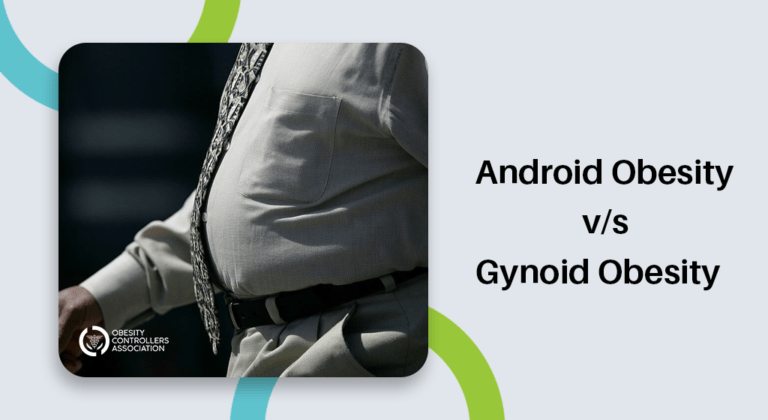Intermittent Fasting – A Complete Guide For Beginners!

Nowadays we get to hear the word Intermittent fasting more and more due to its several benefits. The number of fast days and calorie allotment differ between techniques. Intermittent fasting entails completely or partially refraining from food for a defined time before eating normally again.
How Should A Beginner Start Intermittent Fasting? Expert Tips!
According to some research, this type of eating may provide benefits such as weight loss, improved health, and enhanced longevity. Intermittent fasting advocates believe that it is simpler to stick to than typical calorie-controlled diets.
Each person’s intermittent fasting experience is unique, and different techniques will suit different people. This article discusses the evidence behind the most common variants of intermittent fasting and offers advice on how to stick to this diet.

What Is Intermittent Fasting (IF)?
Intermittent fasting (IF) is an eating pattern in which fasting and eating intervals alternate. It does not state which meals to consume, but rather when to consume them. Daily 16-hour fasts or twice-weekly 24-hour fasts are common intermittent fasting regimens.
Fasting has been part of our lives from the beginning. All year, ancient hunter-gatherers had no stores, refrigerators, or food. They had trouble finding food at times. As a result, humans evolved to be able to endure for extended periods of time without food.
Fasting is sometimes more natural than eating 3-4 (or more) meals each day. Fasting is also often practiced in various religions for spiritual reasons.
Many diets have an emphasis on what to eat, whereas intermittent fasting places an emphasis on when to eat. During intermittent fasting, you only eat at specific times. Fasting for a specific amount of hours per day or eating only one meal a few days per week might assist your body in burning fat. Scientific evidence also points to specific health benefits.
Many neurologists who have been researching intermittent fasting for 25 years claim that our bodies have evolved to be able to survive without food for many hours, days, or even weeks.
Prior to learning to farm, people were hunters and gatherers who evolved to survive — and thrive — for lengthy periods of time without eating. They had to spend a lot of time and energy hunting animals and gathering nuts and berries.
Even 50 years ago, it was simple to keep a healthy weight. People spent more time outside working and playing, and they got more exercise overall.
Television, the internet, and other forms of entertainment are now available 24 hours a day, 7 days a week. We stay up late watching our favorite shows, playing games, and chatting online. We’ve been sitting and eating all day — and much of the night.
More calories and less activity can aggravate obesity, type 2 diabetes, heart disease, and other illnesses. Intermittent fasting, according to scientific research, may help reverse these alterations.
How Does Intermittent Fasting Work?
To understand how intermittent fasting leads to fat loss, we must first distinguish between the fed and fasted states of our body.
When your body digests and absorbs food, it is in a state of nourishment. The fed state often begins when you begin eating and lasts three to five hours as your body digests and absorbs the food you just ate. Because your insulin levels are high when you are eating, it is extremely difficult for your body to burn fat.

After that period, your body enters what is known as the postabsorptive state, which is simply a fancy way of expressing that it is not processing a meal. The post-absorptive stage lasts between 8 and 12 hours following your last meal when you enter the fasting state. Because your insulin levels are low while you fast, it is much simpler for your body to burn fat.
When you fast, your body may burn fat that was previously unavailable during the fed state. Because we don’t enter the fasting state until 12 hours after our previous meal, our bodies are rarely in this fat-burning mode. This is one of the reasons why many people who begin intermittent fasting lose weight without changing their diet, eating habits, or exercise frequency.
Fasting puts your body into a fat-burning condition that you seldom achieve on a regular eating regimen.
Why Does Intermittent Fasting Feel So Good?
We’ll talk about biology for a moment, then explain what it implies. A lot happens in your body while you eat:
- Your blood glucose (sugar) levels may rise as a result of what you’ve eaten.
- Insulin is a hormone that your pancreas produces that releases energy levels in your body.
- Insulin instructs your cells to fill up on glucose while instructing your fat reserves to remain in your fat cells.
- When you’re full, your body produces hormones such as cholecystokinin (CCK) and leptin.
When you consume a lot of carbohydrates and sugar, however, they don’t have the same effect on CCK release as protein and fats do, so your body is less likely to transmit “I’m full!” signals. Eating regularly and in large quantities in one sitting is more likely.
Your pancreas needs to work extra hard to release insulin, and any excess glucose from carbohydrates and sugar is deposited as body fat. These variables can raise your risk of weight gain, insulin resistance, and illnesses such as type 2 diabetes and cancer over time.
Intermittent fasting allows your body to recharge. When you take a meal break, your glucose levels remain steady, your insulin levels decrease, and your body has a chance to clean house—all of which can support key advantages such as weight control and lifespan.
Benefits Of Intermittent Fasting
Some people consider intermittent fasting to help them lose weight. It’s not as simple as that—you need to eat!
When you limit your eating window, your body automatically takes a break from digesting. This leads to a few important intermittent fasting advantages:
Loss Of Excess Weight
Everything from hormones to blood sugar levels influences what appears on the scale. Intermittent fasting has been proven in animal and human research to help avoid insulin resistance and leptin resistance, which may aid in weight management.
An evaluation of intermittent fasting programs found that both alternate-day fasting and whole-day fasting trials were beneficial for lowering body weight, body fat, and total triglycerides.
Inflammation
According to research, intermittent fasting may be good for inflammation. A research of 40 participants during Ramadan, a holy month for Muslims when no food or drink is consumed from dawn to dark for 30 days in a row, discovered that sustained intermittent fasting had a favorable influence on the body’s inflammatory condition.
Research on 16 obese men and women discovered that eight weeks of alternate-day fasting lowered triglyceride levels by 32%.
A related study also supports the benefits of fasting for heart health, finding that a three-week fasting diet resulted in a substantial drop and stabilization of blood pressure in highly obese patients.
Brain Health
Could fasting give your brain a boost? A rat study discovered that fasting on alternate days boosted brain functions and architecture.
Anti-Aging
Intermittent fasting has been found in mouse experiments to improve longevity and protect against illness.
How To Succeed With Intermittent Fasting?
Intermittent fasting may be difficult, especially at first. As you adjust to your new eating pattern, you may experience tiredness, aggravation, and stress in addition to stomach churning.
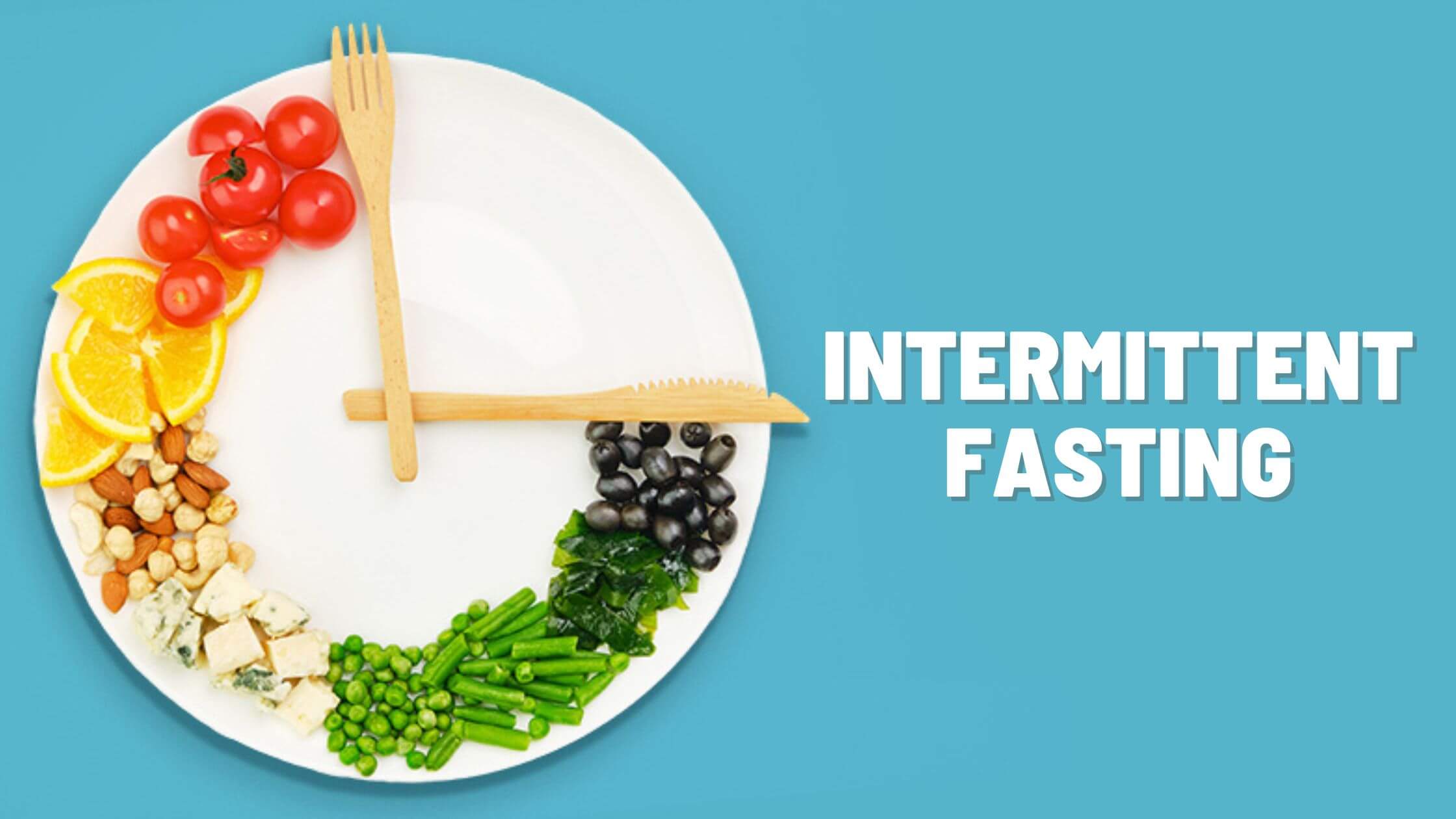
Here are some pointers to make your life simpler:
1. Begin with a revised timetable
Start with a reasonable strategy and progressively increase the intensity and duration of your plan. There’s no need to jump right in!
Develop your tolerance to eating in a smaller time frame each day, then go to the entire timetable when you’re ready.
2. Keep yourself hydrated
During your fasting phase, you should stay hydrated with “noncaloric drinks.” Water, herbal teas, and calorie-free flavored drinks are examples of such beverages.
3. Have Meals gently and in small gaps
Remember that Intermittent Fasting might be harmful if you do not consume the proper number of calories each day. Also, remember to consume in small gaps.
4. Plan ahead of time wholesome, nutritious meals
While you may be tempted to indulge in your favorite snacks and comfort foods once your fast is over, try to adhere to a balanced meal rich in proteins, fruits, and vegetables.
5. Make your meals ahead of time
If your schedule is hectic, set aside some time on the weekend or a few nights a week to prepare some meals ahead of time. This will save you time and assist you in maintaining a healthy diet.
There should be adequate consumption of healthy fat in your evening meal. To keep blood sugar levels stable overnight, many nutritionists advise including healthy fat like olive oil, coconut butter, or avocado in the last meal of the day.
6. Good Sleep
If you have difficulty sleeping, Intermittent Fasting may not be for you. If you can’t sleep through the night, don’t use this method.
Start with sleep. Many people are eager to begin Intermittent Fasting since it saves them time and money.
Others, on the other hand, may find it difficult to begin, especially if they are used to eating three meals and snacks every day.
Intermittent Fasting Weight Loss: Success Tips
That is why many low-carb physicians believe that persons who follow these diets have better success with fasting.
Understand that hunger is a natural emotion that comes and goes in waves. We appear to have been taught to fear hunger and to avoid it at all costs. However, hunger is a normal sensation that we may learn to recognize and then dismiss.
It might go away just as fast as it came on. By following these fasting suggestions, you will increase your chances of success and make intermittent fasting a part of your regular practice.
7 Types Of Intermittent Fasting To Consider
There are so many various methods to accomplish Intermittent Fasting, which is fantastic. If this is something you want to accomplish, you may choose the strategy that works best for your lifestyle, increasing your chances of success.
Here are seven examples:
Fasting 5:2
This is one of the most often used Intermittent Fasting approaches. The successful book The FastDiet popularized it, and it explains everything you need to know about this strategy.
The objective is to eat regularly for five days (without counting calories), then eat 500 or 600 calories per day for women and men, accordingly.
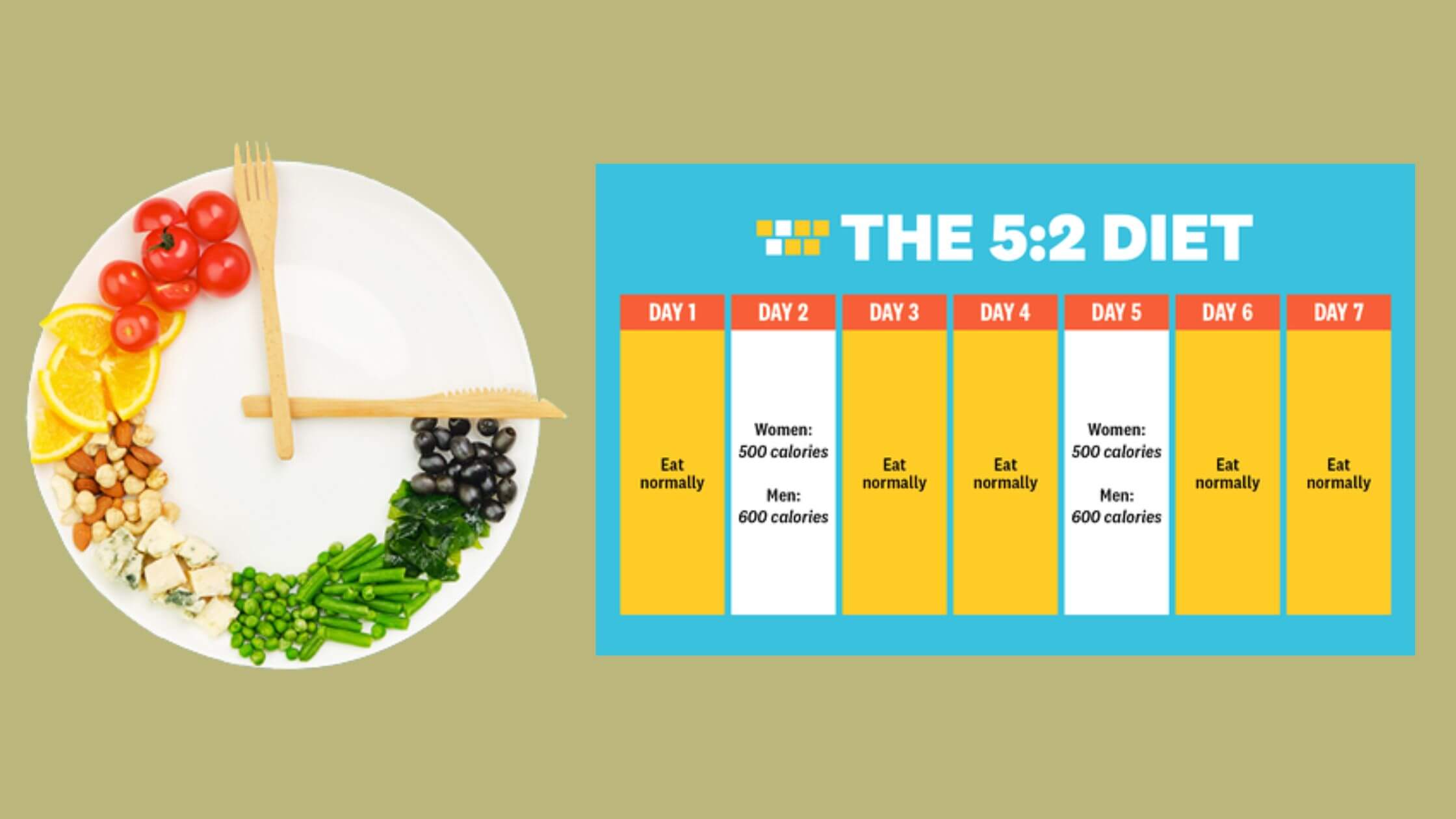
Fasting days can be any day you like. The concept is that brief periods of fasting keep you cooperative; if you become hungry on a fasting day, just look forward to the following day, when you may “feast” again.
Some individuals say, ‘I can do anything for two days, but restricting my diet for seven days is too much for me.’. For certain folks, a 5:2 diet may be more effective than decreasing calories for the full week.
However, The FastDiet authors advise avoiding fasting on days when you will be undertaking a lot of endurance activity. If you’re preparing for a cycling or running event (or running high-mileage weeks), consider if this form of fasting will fit into your schedule. Alternatively, see a sports nutritionist.
Time-Limited Fasting
You pick an eating window every day with this sort of Intermittent Fasting, which should ideally leave a 14- to 16-hour fasting time. Because of hormonal problems, many women fast for no more than 14 hours each day.
Experts explain that Fasting stimulates autophagy, the natural ‘cellular housekeeping’ process by which the body clears detritus and other items obstructing mitochondrial health, which begins when liver glycogen is depleted. Doing so may assist enhance fat cell metabolism and optimize insulin activity.
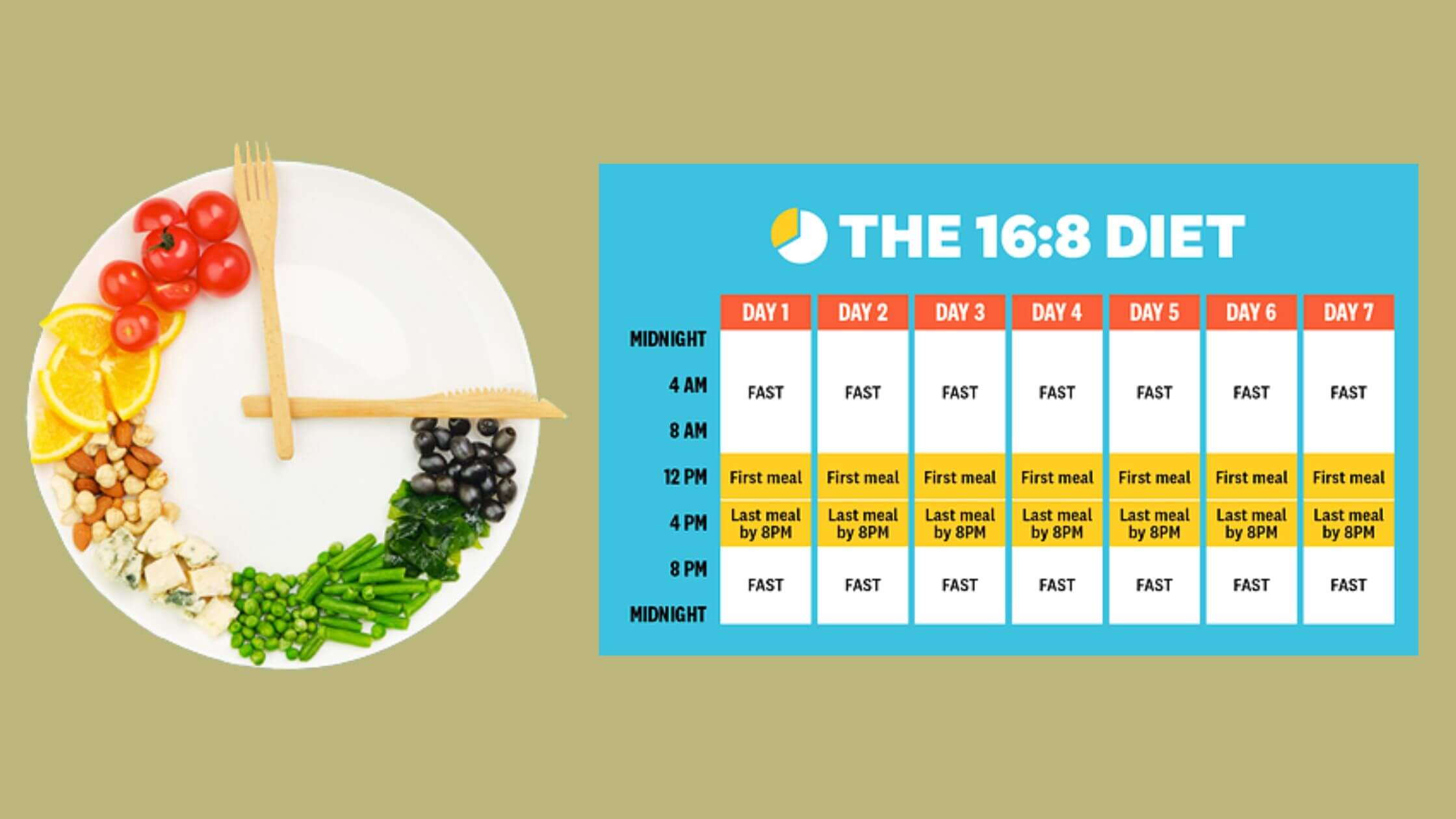
You could, for example, set your eating window from 9 am to 5 pm. It can work especially well for someone with a family who eats an early supper anyhow. The majority of the fasting period is therefore spent sleeping. You don’t have to “miss” any meals depending on when you set your window.
However, this is based on your ability to stay consistent. If your schedule is always changing, if you require or desire the flexibility to go out to breakfast on occasion, go on a late date night, or go to happy hour, daily fasting may not be for you.
Fasting Overnight
This method is the simplest of the lot and entails fasting for 12 hours daily.
As an example: Choose to stop eating after supper at 7 p.m. and then begin eating at 7 a.m. the next morning with breakfast. Autophagy occurs around the 12-hour mark, but the advantages are milder. This is the absolute minimum number of fasting hours.
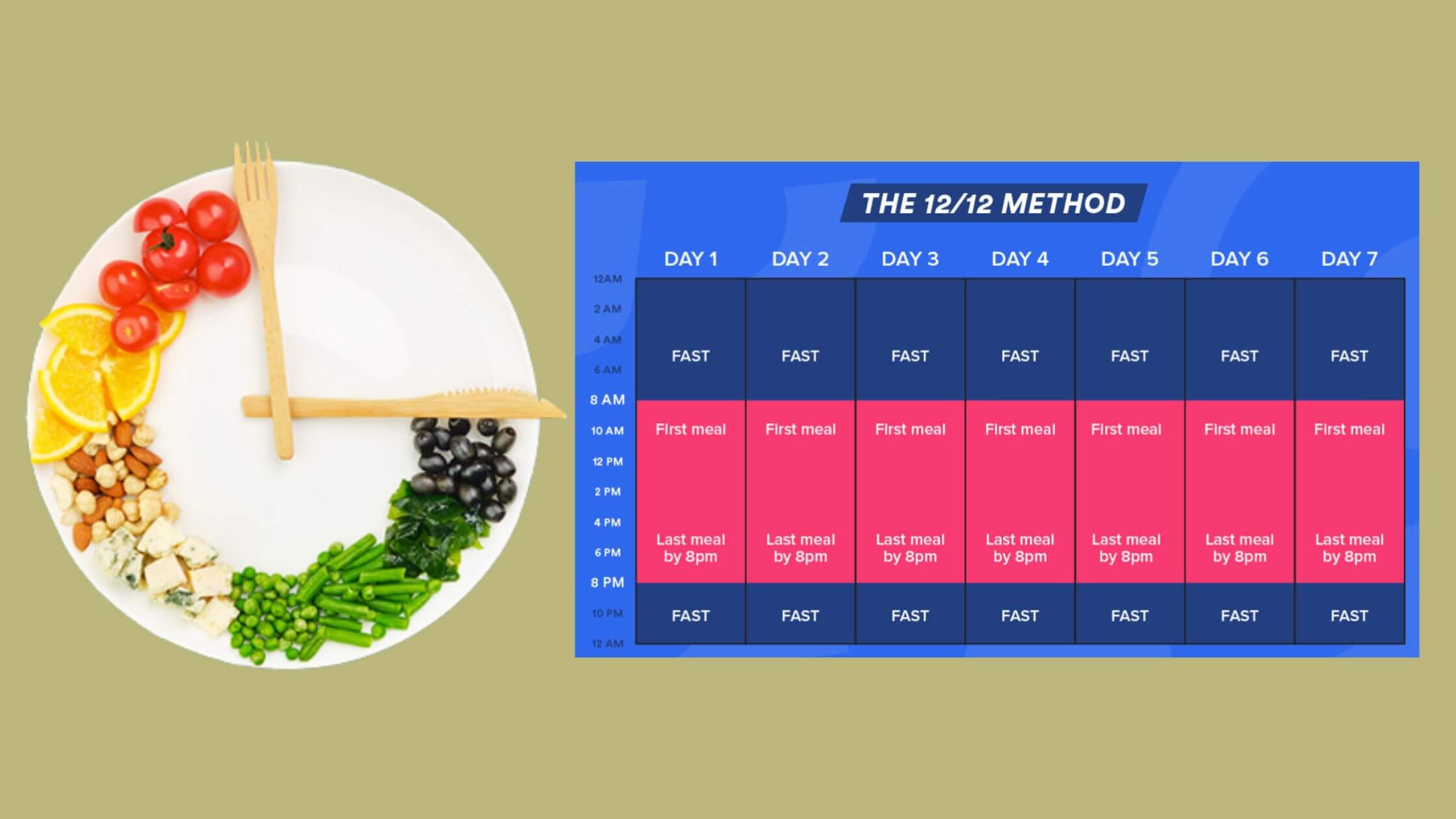
This method is not that difficult to follow. You also don’t have to miss meals; all you’re doing is removing a nighttime snack (if you ate one to begin with). However, this strategy does not optimize the benefits of fasting.
If you’re fasting to lose weight, a narrower fasting window implies more time to eat, which may not help you reduce your calorie intake.
Eat, Stop, And Eat
This concept of fasting is simply temporary abstinence from food. You commit to a resistance exercise regimen and one or two 24-hour fasts weekly. When your fast is done, I want you to eat appropriately and like it never occurred.
Eating responsibly entails returning to a regular eating pattern in which you do not want to binge because you have just fasted, but you also should not restrict yourself with an excessive diet or eat less than you require.
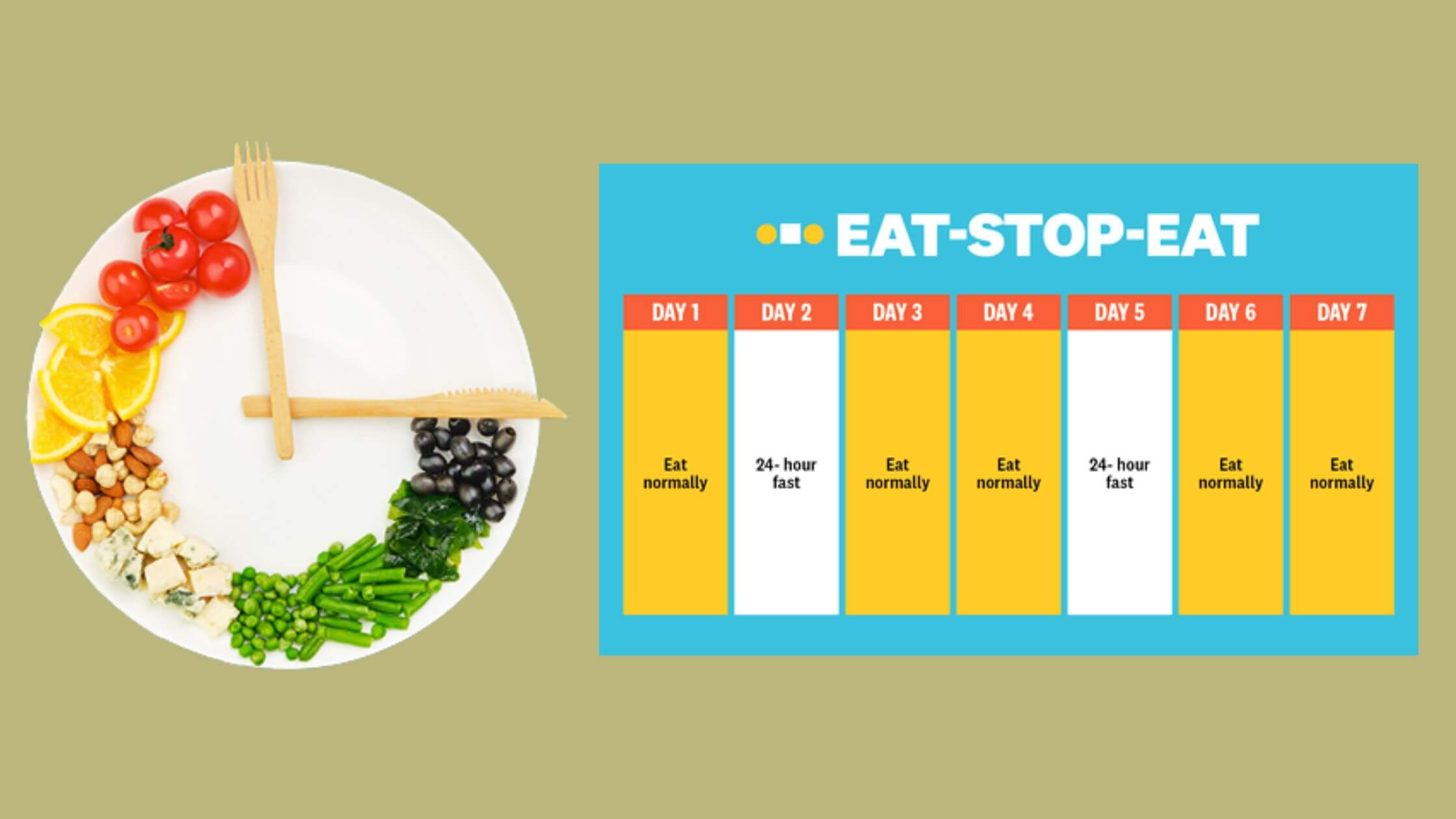
Intermittent fasting mixed with regular weight exercise for fat reduction.
Fasting during one or two 24-hour periods during the week enables you to consume somewhat more calories on the other five or six non-fasting days. That makes it easier and more fun to conclude the week with a calorie deficit without feeling compelled to follow a strict diet.
Complete-Day Fasting
You just eat once a day here. Some individuals will eat supper and then not eat again until the next day’s dinner. The fasting periods with whole-day fasting are effectively 24 hours (dinner to dinner or lunch to lunch), but the fasting time with 5:2 is truly 36 hours.
(For example, you may have supper on Sunday, then “fast” on Monday by consuming 500 or 600 calories, followed by breakfast on Tuesday.)
The benefit of whole-day fasting for weight loss is that it is extremely difficult (but not impossible) to consume a whole day’s worth of calories in one sitting. The problem with this strategy is that it is difficult to obtain all the nutrients your body requires to function correctly with just one meal.
Not to mention how difficult it is to maintain this strategy. You may get quite hungry by the time supper arrives, leading you to choose poor calorie-dense selections.
Consider this: When you’re hungry, you’re not likely to crave broccoli. Many individuals drink too much coffee to satisfy their appetite, which might interfere with their ability to sleep. You may get cognitive fog throughout the day if you don’t eat.
Fasting on alternate days
People may fast every other day, with a “fast” consisting of 25% of their daily calorie needs (about 500 calories), and nonfasting days being typical eating days. This is a common method for losing weight.
In fact, research has shown that alternate-day fasting dramatically reduces body mass index, weight, fat mass, and total cholesterol in overweight persons.
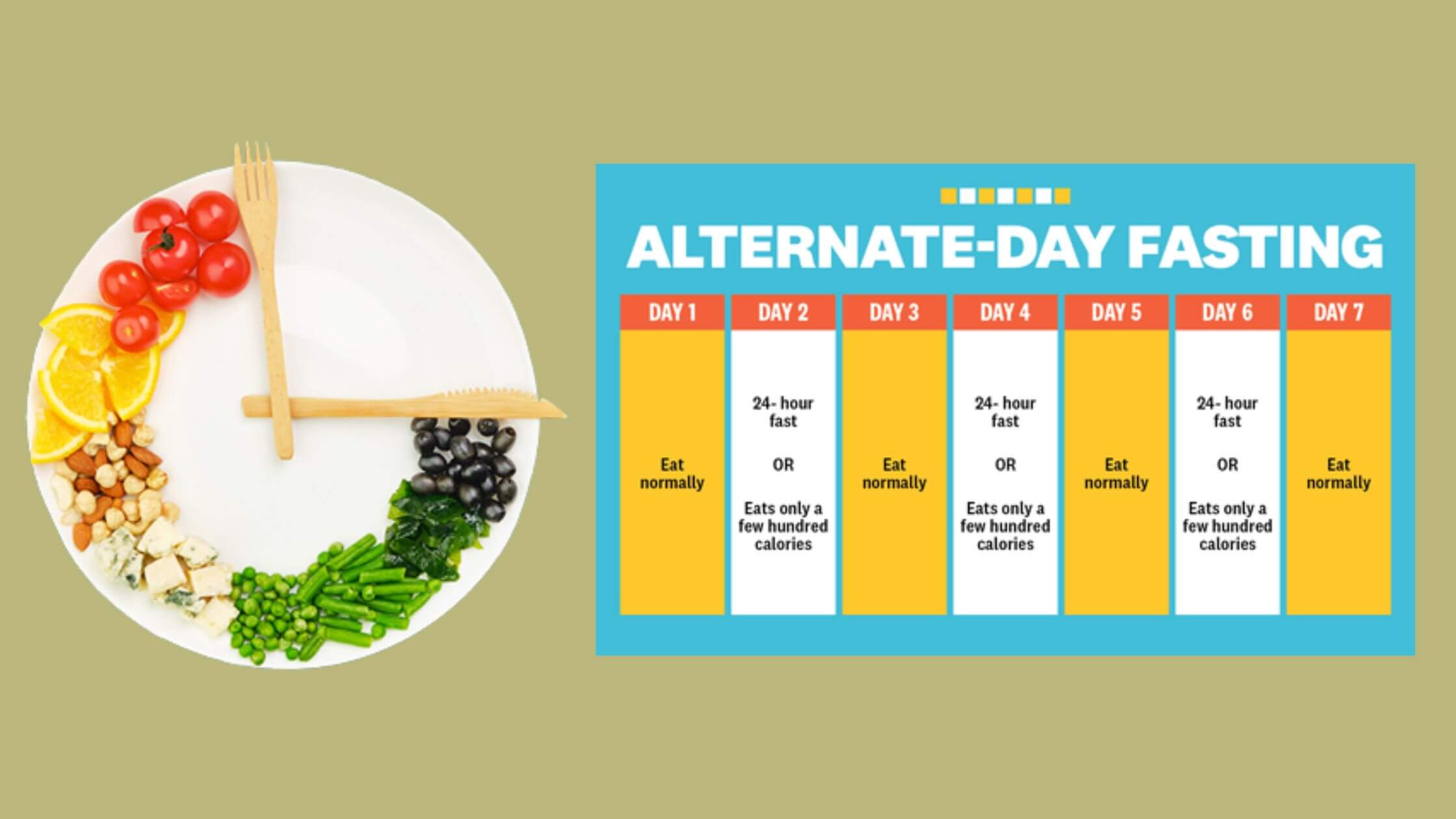
You might be concerned about feeling hungry while fasting. Negative effects of alternate-day fasting (such as hunger) lessened by week two, and individuals began to feel more content with the diet around week four.
The negative was that research participants reported they were never truly “full” over the eight weeks of the experiment, which can make sticking to this technique difficult.
Pick-Your-Own-Day Fasting
This is a more pick-your-own-adventure approach to Intermittent Fasting. You are doing time-restricted fasting (fast for 16 hours, eat for eight) every other day or once or twice a week. That is, on Sunday, you might eat generally until 8 p.m., and then you might eat again on Monday at noon.
It’s essentially the same as missing breakfast a couple of times a week. Keep in mind that evidence on the effect of skipping breakfast on weight reduction is conflicting. There is no compelling evidence that missing breakfast impacts weight.
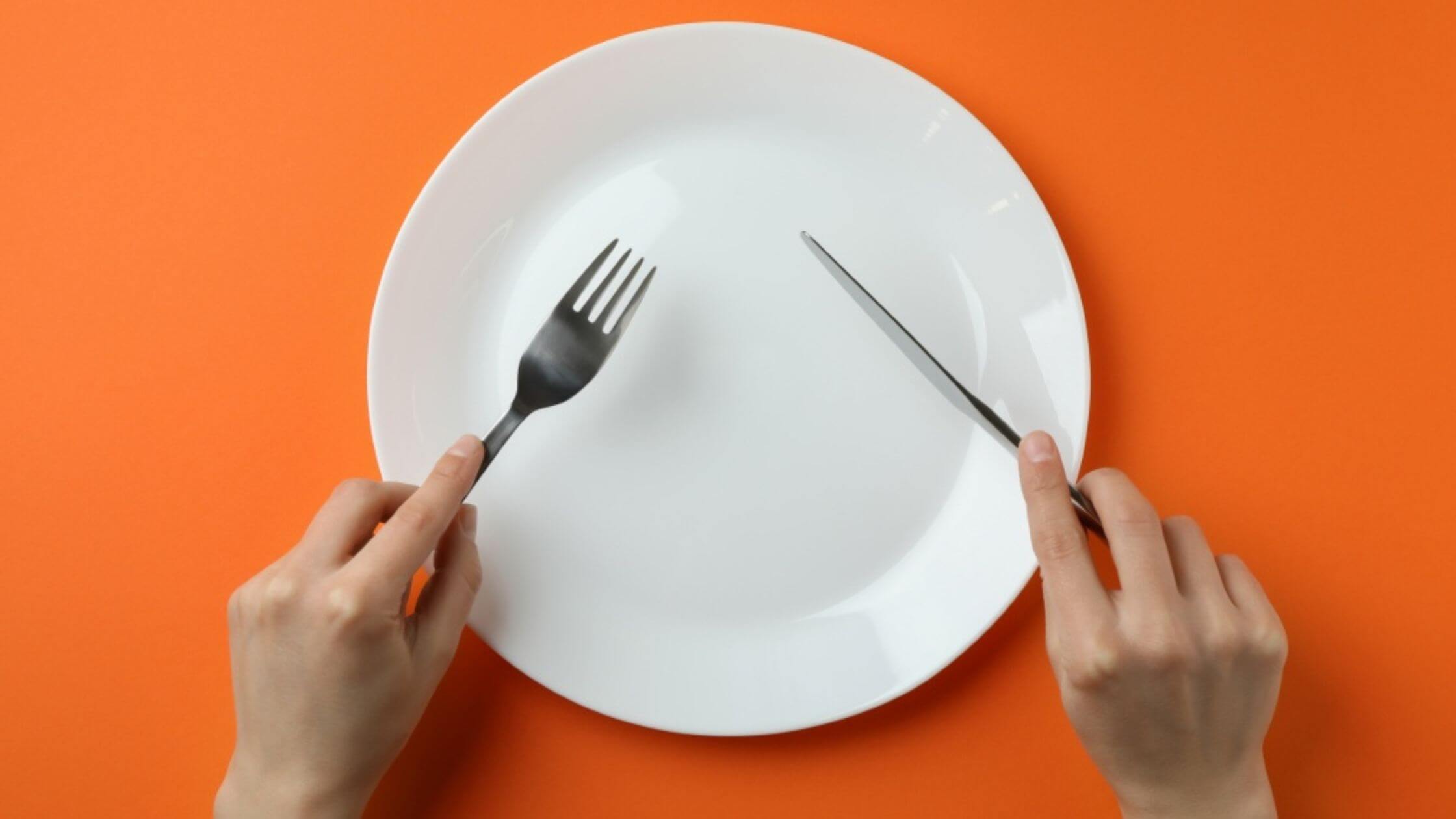
However, other studies have indicated that eating a breakfast meal might have a minor influence on weight loss.
Another study has connected breakfast skipping to an increased risk of cardiovascular disease death. This strategy is more adjustable to your lifestyle and goes with the flow, which means you can make it work even if your schedule varies from week to week.
However, a softer approach may result in lesser advantages.
Who Should Not Do Intermittent Fasting?
Although intermittent fasting may be a good option for some people, it is not suitable or safe for others. Intermittent fasting may provide a risk of harmful side effects for some persons.
Healthcare specialists typically advise against intermittent fasting for the following people:
- Young toddlers
- Women who are pregnant or breastfeeding
- Elderly people who are experiencing frailty
- Immunocompromised individuals
- Persons who have or have had eating problems
- Dementia patients
- People who have had severe brain damage or post-concussive syndrome
This is not a complete list, and there are exceptions. Fasting, for example, has been used by doctors to treat epilepsy in youngsters.
If you have a medical problem or are presently taking drugs, you should consult with a trusted healthcare provider about the advantages and dangers of intermittent fasting.
Certain people may be more vulnerable to the negative side effects of fasting, so it’s critical to establish whether intermittent fasting is a safe option for your unique needs.
Furthermore, if you encounter long-term adverse effects from intermittent fasting, it may be an indication that it isn’t working for your body. These might be the adverse effects:
- Severe hunger
- Nausea
- Irritability
- Headaches
- Fatigue\faintness
If intermittent fasting is making you unhappy, stop doing it. Even though this manner of eating has been linked to health advantages, there are several other things you may do to improve your health that does not include fasting.
Maintaining a balanced and healthy diet, getting enough sleep, engaging in regular physical activity, and managing stress are far more essential for supporting overall health.
Is Intermittent Fasting Beneficial For Women?
Fasting can have distinct effects on women’s bodies and hormones throughout the month, making intermittent fasting for women a bit more difficult topic to traverse than it is for males.
Women’s bodies follow a monthly cycle, with a uterine and ovulatory cycle running concurrently, generating hormonal changes.
Women may benefit from intermittent fasting, but they should be more casual about how they fast due to the influence these hormones have on hunger and energy requirements.
There is no such thing as a one-size-fits-all method for dieting. Women, on average, should adopt a more flexible attitude toward fasting than males.
This may entail shorter fasting times, fewer fasting days, and/or taking fewer calories on fasting days.
Here are some of the finest intermittent fasting diets for women:
- Fasting for 12-16 hours two to three days each week.
- Fasting days should not be consecutive and should be spread equally throughout the week (for example, Monday, Wednesday, and Friday).
- A complete 24-hour fast once or twice a week (maximum of two times a week for women). Begin with 14-16 hour fasts and progressively increase.
- The 5:2 Diet: Limit your calorie intake to 25% of your regular intake (approximately 500 calories) twice a week and eat “normally” the other five days.
- Fasting every other day yet eating “normally” on non-fasting days is known as modified alternate-day fasting. On a fasting day, you may ingest 20-25% of your typical calorie intake (approximately 500 calories).
- The 16/8 Technique consists of fasting for 16 hours a day and consuming all calories within an eight-hour window. Women are encouraged to begin with 14-hour fasts and gradually increase to 16 hours.
Whatever you choose, it is critical to eat healthily during non-fasting periods.
You may not see the same weight reduction and health advantages if you eat a lot of bad, calorie-dense items during the non-fasting times.
At the end of the day, the optimal method is one that you can endure and continue over time while having no negative health implications.
⚠️ What Are The Disadvantages Of Intermittent Fasting?
Intermittent fasting may have unintended consequences. Hunger is one of the most prevalent negative effects of fasting for an extended length of time.
Year-long research of 112 people indicated that those who fasted had higher hunger levels than those who ate a low-calorie diet with constant calorie restriction.

Furthermore, if you’re used to eating throughout the day, changing your routine may be a mental barrier. But don’t be disheartened. It takes time to acclimate and adapt to any lifestyle adjustment.
Cravings and hunger
It may come as no surprise that one of the most prevalent negative effects of intermittent fasting is hunger. When you restrict your calorie intake or go for extended periods without eating, you may sense increased hunger.
Research with 112 individuals allocated some to an intermittent energy restriction group. They ate 400 or 600 calories on two nonconsecutive days each week for a year. These groups experienced more hunger than those who followed a low-calorie diet with continual calorie restriction.
According to research, hunger is a symptom that most individuals experience during the first few days of a fasting program. One 2020 research included 1,422 patients who took part in fasting regimens spanning 4-21 days. They exhibited hungry sensations only during the first several days of the regimens.
As a result, sensations such as hunger may subside as your body adjusts to regular fasting intervals.
Lightheadedness and headaches
Intermittent fasting is frequently associated with headaches. They are most common during the first several days of a fasting program.
A 2020 review included 18 research involving patients on intermittent fasting regimens. Some individuals experienced moderate headaches in the four trials that recorded side effects.
Researchers revealed that “fasting headaches” are commonly located in the frontal part of the brain, with pain ranging from mild to severe in degree.
Furthermore, persons who frequently suffer from headaches are more likely to suffer from headaches when fasting than those who do not.
Researchers believe that headaches during intermittent fasting may be caused by low blood sugar and caffeine withdrawal.
Digestive problems
If you practice intermittent fasting, you may encounter digestive difficulties such as constipation, diarrhea, nausea, and bloating.
The reduced food intake associated with some intermittent fasting regimes may have a severe impact on your digestion, producing constipation and other adverse effects.
Furthermore, dietary modifications connected with intermittent fasting regimens may produce bloating and diarrhea.
Dehydration, another common side effect of intermittent fasting, can aggravate constipation. As a result, staying well hydrated when intermittent fasting is critical.
Tiredness and poor energy
According to research, some persons who practice various kinds of intermittent fasting feel weariness and poor energy levels. Low blood sugar caused by intermittent fasting might make you fatigued and weak.
Furthermore, intermittent fasting may induce sleep disruptions in certain persons, resulting in fatigue during the day.
However, some research suggests that intermittent fasting might lessen tiredness, particularly when your body adapts to regular fasting intervals.
Bad smells
Bad breath is an unpleasant side effect that some individuals experience when intermittent fasting. This is produced by a decrease in salivary flow and an increase in acetone in the breath.
When you fast, your body utilizes fat as fuel. Because acetone is a byproduct of fat metabolism, it accumulates in your blood and breath during fasting.
Furthermore, dehydration, a sign of intermittent fasting, can produce a dry mouth, which can contribute to foul breath.
Sleep problems
According to some studies, sleep difficulties, such as the inability to fall or remain asleep, are among the most prevalent negative effects of intermittent fasting.
In a 2020 research, 1,422 participants took part in fasting regimens spanning 4-21 days.
According to the study, 15% of individuals experienced sleep difficulties as a result of fasting. This was reported more frequently than other adverse effects.
Because your body excretes huge amounts of salt and water through the urine during the first few days of an intermittent fasting diet, fatigue may be more prevalent.
This might result in dehydration and low salt levels.
Dehydration
As previously stated, the body excretes a substantial volume of water and salt in the urine during the first few days of fasting. This is known as natural diuresis or fasting natriuresis.
If you experience this and do not replace the fluids and electrolytes lost through pee, you may become dehydrated.
Furthermore, persons who practice intermittent fasting may forget to drink or drink insufficiently. This is especially likely when you initially start an intermittent fasting practice.
Keep an eye on the color of your urine and drink lots of water throughout the day. It should preferably be a light lemonade color. Dark-colored urine may suggest dehydration.
Malnutrition
Intermittent fasting, if not done correctly, can result in malnutrition. Malnutrition can occur if a person fasts for an extended length of time and does not refill their body with necessary nutrients. The same is true for ill-planned continuous energy restriction regimens.
People may typically satisfy their calorie and nutritional demands while participating in various forms of intermittent fasting programs.
However, if you do not properly plan or implement your fasting program over a long length of time, or if you purposely restrict calories to an excessive degree, you may have malnutrition as well as other health concerns.
That is why it is critical to eat a well-balanced, healthy meal when fasting intermittently.
Never reduce your calorie intake excessively.
A healthcare expert with knowledge of intermittent fasting can assist you in developing a safe strategy that offers the optimum quantity of calories and nutrients for you.
Conclusion
Everyone has unique dietary requirements based on factors such as exercise level and body composition.
If you need to change your intermittent fasting strategy, your body will tell you, and this eating pattern isn’t for everyone.
That is completely OK.
What is important is that you’re doing what makes you feel your best every day.
In conclusion, intermittent fasting or time-limited eating may be the most convenient strategy to enhance metabolic health and reduce weight. It saves time and money, and it is possible to succeed regardless of your food pattern.
The important thing is to do it in a way that seems sustainable and fits into your lifestyle.
Give it a go!
Related Posts
✔️ Intermittent Fasting – Before & After Weight Loss Stories By Reddit Users!
✔️ Overview Of The Pros And Cons Of Intermittent Fasting
✔️ What Can You Eat & Drink In Intermittent Fasting?
FAQs: Enquiries And Doubts
Intermittent Fasting is not advised for persons who have a history of eating disorders such as anorexia or orthorexia.
Intermittent fasting may interfere with sleep and attention in certain people. Certain people may experience increased stress, anxiety, and irritability as a result of it.
In general, health professionals suggest eating entire, nutritious meals. Regardless, you must consume enough calories each day to keep your body running. Eating nutrient-dense meals high in fat, protein, and fiber will help keep blood sugar constant.
Intermittent fasting can be done in a number of ways. While the 16/8 model is the most frequent and easiest to implement, other versions include the 5/2 model, which calls for calorie restriction twice a week, and the alternate-day model, which calls for calorie restriction every other day.
Currently, data is unclear as to whether one type is more healthy than another, so try out several ways to find which one works best for your body and lifestyle.
Yes.
Water, coffee, tea, and other caloric-free liquids are acceptable. Do not sweeten your coffee. Small quantities of milk or cream may be permissible.
Coffee is very useful during a fast since it suppresses appetite.
The majority of the research on fasting and muscle loss comes from studies that look at fasting for days to weeks.
In this evidence-based approach, we review the most relevant scientific literature on Intermittent Fasting, concluding that considerable muscle loss with Intermittent Fasting is extremely improbable, especially if you eat enough protein and engage in resistance exercise.




